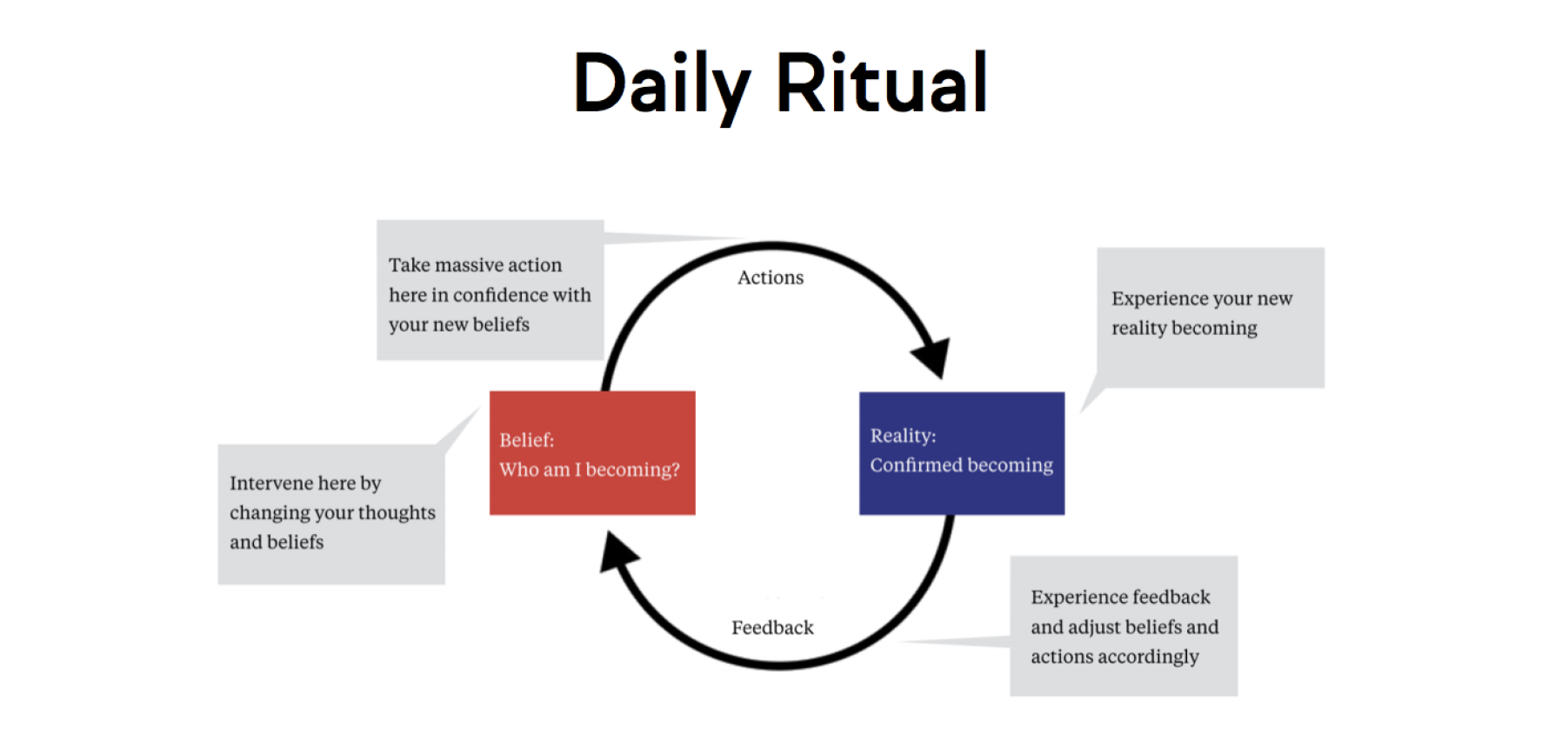On Becoming What We Ought To Be
 Above is the embodiment of all the great achievers today and in the past. Embracing the above algorithm is the truest path to changing oneself into what is necessary to achieve one’s great and worthy purpose in life. Without changing the beliefs that no longer suit you, you cannot achieve the level of performance that is necessary to be the best form of yourself. Rooted first in one’s beliefs, this next involves thinking about, becoming, and performing all that is necessary to optimize one’s potential, and then being able to decenter enough to be able to accept any and all criticism on one’s performance. If you can use the criticism for your benefit, then it is constructive. If you cannot, then it is worthless and should be removed from your psyche. That is how you continuously perfect the process. That is what this journal opens the door to: an unconventional approach to self-optimization.
Above is the embodiment of all the great achievers today and in the past. Embracing the above algorithm is the truest path to changing oneself into what is necessary to achieve one’s great and worthy purpose in life. Without changing the beliefs that no longer suit you, you cannot achieve the level of performance that is necessary to be the best form of yourself. Rooted first in one’s beliefs, this next involves thinking about, becoming, and performing all that is necessary to optimize one’s potential, and then being able to decenter enough to be able to accept any and all criticism on one’s performance. If you can use the criticism for your benefit, then it is constructive. If you cannot, then it is worthless and should be removed from your psyche. That is how you continuously perfect the process. That is what this journal opens the door to: an unconventional approach to self-optimization.
Where you currently are in life (regarding health, finance, relationships, attitude, beliefs, etc.) is one huge summation of your actions. While there are some exceptions, by and large you choose your current situation, whether consciously or not. The consequences of your previous choices have led to your current situation. That’s difficult to disprove. Yet, the good news is that you can change your current situation in life. By changing “who you currently are,” you can become what you need to be. Much easier said than done, though, I’m afraid.
You see, the hardest dragon to slay in this lifetime is that of the status quo. It is what prevents us from becoming the highest version of ourselves that we can imagine. It is what forces us to remain just above the lowest versions of ourselves that we can accept. (Read that again.) We often hear talk about changing our habits, yet not many of us want to accept the fact that we don’t actually have habits: they have us. The void between who we are and who we wish to become is filled with our habits. Displacing those habits that no longer serve us is the only real hope we have in regards to true accomplishment. I choose the term “displacing” because it refers to a continuous action. To “replace” our habits would signify a sort of one-and-done type of process. That would be ideal, but it is not reality. The reality is that we are engaged in constant battle with ourselves. Our deep mental ruts continue to pull us in a direction that we no longer want to take.
But to sway the odds in our favor, we must remain constantly aware of our intentions and our behavior. That is what we strive to do with our High Performance Health Institute (HPHI) clients daily. We help to bridge their intention with their behavior. To succeed at this, though, requires our clients to continue to circle back to what they are trying to accomplish and what are the results. This is what this journal allows you to do. It forces you to jot down your intentions and then assess not only your outcomes, but the roadblocks that could be preventing you from fully optimizing your time. Another consultant puts this into a nice picture that most folks can visualize quite nicely:

Thinking leads to action, and action creates feedback. What you choose to do with that feedback is the ultimate differentiator between success and failure. Between learning and changing, or allowing oneself to become a victim and submitting to the status quo. This is where a vision board comes in quite nicely, a tangible visual or digital equivalent. Are your thoughts, actions, and results moving you closer to your vision, or not?
Becoming who you wish requires forgetting who you currently are. Who you are is limiting you. It is keeping you exactly where you don’t want to be. But to change yourself, you must know two things: who you are and who you wish to become. How do those two people think? How do they act? How do they allow others and the world to influence them? The identity exercise in the following pages will help flush out those thoughts and particulars.
Also, part of becoming someone else (i.e., the highest version of yourself) requires you to know what really matters in your life. In order for you to start thinking with an accomplishment-oriented mindset, you must ensure that you spend your time on the things that are going to make a difference: your “big rocks.” Most of you have probably heard the story about the college professor and his experiment to show the class the meaning of life. If you are unfamiliar with this story, we have provided it herein. Take some time to list out your big rocks. The minutia (the sand and water) doesn’t or shouldn’t matter. Accomplish the big things first, and then utilize the remaining time for other “activities.”
HPHI offers professional coaching services in the field of leadership, health, wellness and performance.
